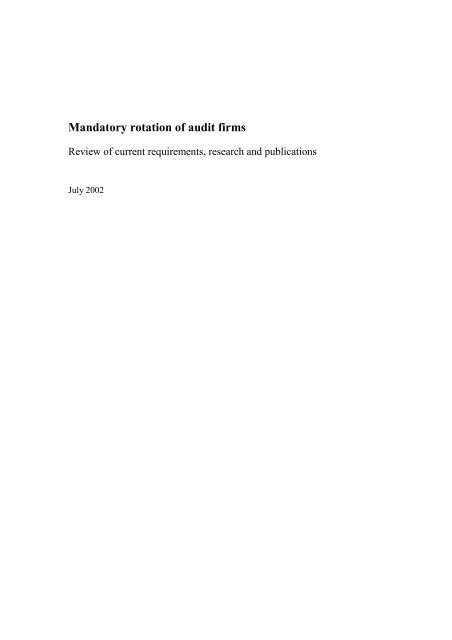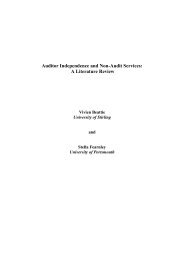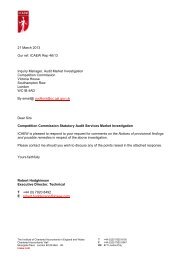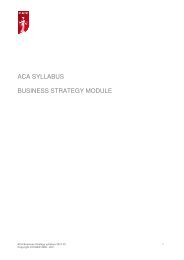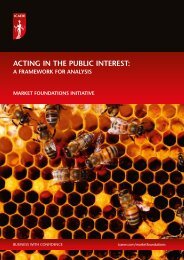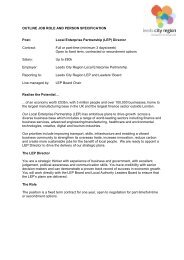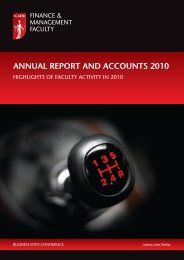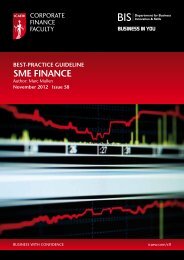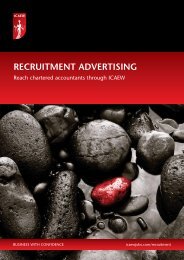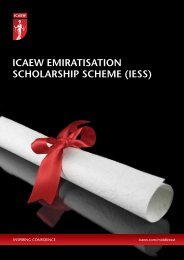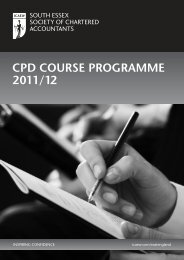Mandatory rotation of audit firms - ICAEW
Mandatory rotation of audit firms - ICAEW
Mandatory rotation of audit firms - ICAEW
You also want an ePaper? Increase the reach of your titles
YUMPU automatically turns print PDFs into web optimized ePapers that Google loves.
<strong>Mandatory</strong> <strong>rotation</strong> <strong>of</strong> <strong>audit</strong> <strong>firms</strong>Review <strong>of</strong> current requirements, research and publicationsJuly 2002
Contents1 Executive summary 12 Scope <strong>of</strong> review 43 Current regulatory framework 74 Review <strong>of</strong> research and publications 115 References and research 23iii
<strong>Mandatory</strong> <strong>rotation</strong> <strong>of</strong> <strong>audit</strong> <strong>firms</strong>1 Executive summaryBackgroundThe Institute is committed to quality <strong>audit</strong>s and recognises the need to re-examine its position onaspects <strong>of</strong> ethical and <strong>audit</strong>ing standards when these are called into question. Comments regardingthe factors contributing to recent company failures and the lessons to be learned has led, inter alia,to a demand to reconsider <strong>audit</strong>or independence, one aspect <strong>of</strong> which is whether the effectiveness<strong>of</strong> <strong>audit</strong>or performance may be negatively impacted by the length <strong>of</strong> the <strong>audit</strong>or-client relationship(the ‘over-familiarity threat’) and whether mandatory <strong>audit</strong>or <strong>rotation</strong> should be required as asafeguard to ensure and/or demonstrate that <strong>audit</strong>or independence is not compromised.The concept <strong>of</strong> mandatory <strong>audit</strong>or <strong>rotation</strong> is that a company’s <strong>audit</strong>ors should provide services fora defined period only, after which they should be replaced by a different firm <strong>of</strong> <strong>audit</strong>ors.This paper sets out the findings from reviews <strong>of</strong>:• current regulatory requirements setting out how the over-familiarity threat is addressed• reports <strong>of</strong> recent reviews commissioned by Governments• research and studies carried out by academics.Current regulatory requirementsThere is no regulatory requirement for UK listed companies to change <strong>audit</strong>ors after a number <strong>of</strong>years in <strong>of</strong>fice. However, where the same <strong>audit</strong> engagement partner acts for an <strong>audit</strong> client for aprolonged period, a familiarity threat is recognised as arising. As a result, the UK regulatoryrequirements are that, for listed companies, the <strong>audit</strong> engagement partner cannot act for more thanseven years and cannot return to that role for a further five years.Findings <strong>of</strong> reviews commissioned by GovernmentsThe two most recent Governmental reviews – the Review <strong>of</strong> Auditing in the Republic <strong>of</strong> Irelandand the Independence <strong>of</strong> Australian Company Auditors Review (the ‘Ramsay Review’), both <strong>of</strong>which reported in 2001 – included mandatory <strong>rotation</strong> in their considerations but concluded that itis not required. The Ramsay review stated ‘the anticipated cost, disruption and loss <strong>of</strong> experienceto companies is considered unacceptably high, as is the unwarranted restriction on the freedom <strong>of</strong>companies to choose their own <strong>audit</strong>ors’.Other overseas studiesThese include two recent studies carried out in Spain by Arrunada and Paz-Ares entitled‘Economic consequences <strong>of</strong> mandatory <strong>audit</strong>or <strong>rotation</strong>’ published in 1995 and in Italy by SDAUniversita Bocconi in 2002 entitled ‘The impact <strong>of</strong> mandatory <strong>audit</strong> <strong>rotation</strong> on <strong>audit</strong> quality andon pricing: the case <strong>of</strong> Italy’ and are particularly apposite. Spain had a system that requiredmandatory <strong>audit</strong>or <strong>rotation</strong> until 1995 when it was dropped. Italy still requires mandatory <strong>rotation</strong>for listed companies. Both studies identify (i) the significant additional costs incurred by <strong>firms</strong> andmanagement and (ii) the adverse effects on <strong>audit</strong> quality in the early years <strong>of</strong> appointment (due to alack <strong>of</strong> cumulative client knowledge) that arise from mandatory <strong>rotation</strong>.1
<strong>Mandatory</strong> <strong>rotation</strong> <strong>of</strong> <strong>audit</strong> <strong>firms</strong>Key themes and argumentsThe results <strong>of</strong> the governmental reviews and academic research has shown that there are a number<strong>of</strong> key themes and arguments, both for and against, mandatory <strong>rotation</strong>. These are predominantlyconcerned with the expected impact <strong>of</strong> mandatory <strong>rotation</strong> on:• Auditor objectivity and independence(i)(ii)(iii)<strong>rotation</strong> as a means <strong>of</strong> enhancing independencethe perception <strong>of</strong> objectivity and independence<strong>audit</strong>or <strong>rotation</strong> and opinion shopping• Quality <strong>of</strong> <strong>audit</strong> work(i)(ii)(iii)(iv)rigour <strong>of</strong> the <strong>audit</strong> processincidence <strong>of</strong> <strong>audit</strong> failurescumulative knowledgeinvestment by <strong>audit</strong> <strong>firms</strong>• Cost <strong>of</strong> <strong>audit</strong>s(i)(ii)(iii)competition in the <strong>audit</strong> industry‘first time through’ <strong>audit</strong> costscost <strong>of</strong> management time• Other practical considerations(i)(ii)(iii)<strong>audit</strong>s <strong>of</strong> specialised industriesimpact on freedom <strong>of</strong> choicenatural occurrence <strong>of</strong> <strong>rotation</strong>ConclusionsThe review <strong>of</strong> research and publications has indicated that there is a significant amount <strong>of</strong> opinionand conjecture compared to the empirical evidence and studies that exist. It should also be notedthat the research and studies in many cases had been performed or written in excess <strong>of</strong> 15 yearsago and that the extent <strong>of</strong> more recent material is limited. The most recent empirical studies arethose performed in Spain and Italy referred to above.The research carried out shows that there are arguments for and against mandatory <strong>rotation</strong>. Theperceived benefits <strong>of</strong> mandatory <strong>rotation</strong> can be summarised as (i) an improvement in <strong>audit</strong> qualitydue to the avoidance <strong>of</strong> over-familiarity with the client and its management and the opportunity fora fresh approach to the <strong>audit</strong>, (ii) a better perception <strong>of</strong> <strong>audit</strong>or independence, and (iii) the benefits<strong>of</strong> competition. On the other hand, it is generally recognised that there are (i) additional start-upcosts affecting both the <strong>audit</strong>or and client, (ii) adverse effects on the quality <strong>of</strong> the <strong>audit</strong> due to a2
<strong>Mandatory</strong> <strong>rotation</strong> <strong>of</strong> <strong>audit</strong> <strong>firms</strong>lack <strong>of</strong> familiarity in the first and early years <strong>of</strong> the <strong>audit</strong>, (iii) a lack <strong>of</strong> incentive if the <strong>audit</strong> isabout to change hands and (iv) the signals that may be given out currently when there is a change<strong>of</strong> <strong>audit</strong>or will be lost.As indicated above, the recent reviews in Australia and the Republic <strong>of</strong> Ireland concluded that, inbalancing the arguments, the costs <strong>of</strong> mandatory <strong>rotation</strong> outweighed the benefits. The SDAUniversita Bocconi paper suggests mechanisms for focusing on single partners, rather than on<strong>audit</strong> <strong>firms</strong> through partner <strong>rotation</strong>, the role <strong>of</strong> the second partner, ‘peer review’ and controlscarried out by the ‘vigilance authority’, proposals that are largely, if not wholly, in place in theUK.Other considerationsAreas not considered in this paper but which are, or may be, relevant to reaching a conclusionabout the need for mandatory <strong>rotation</strong> include:• the frequency <strong>of</strong> <strong>rotation</strong> eg three years, five years or longer and, for example, the likelihoodthat the shorter the period the higher the costs <strong>of</strong> the <strong>audit</strong> and client management time.• whether there is, at least in the short term, the possibility or probability <strong>of</strong> a lack <strong>of</strong> choicewhen appointing a new firm eg (i) acting as an expert witness may rule out one or more <strong>firms</strong>from being appointed and (ii) the <strong>audit</strong>or <strong>of</strong> a client’s competitor may rule that firm out fromseeking appointment.• whether problems such as those in the previous bullet point would be exacerbated if a firmcould not be re-appointed for a number <strong>of</strong> years.• the impact <strong>of</strong> any other steps which have been mooted, such as the banning <strong>of</strong> the provision <strong>of</strong>non-<strong>audit</strong> services to <strong>audit</strong> clients – for example, a firm providing non-<strong>audit</strong> services might notbe able or might not wish to give up that work and therefore rule itself out as a potential<strong>audit</strong>or.• whether the issues that <strong>rotation</strong> is perceived as addressing will be better dealt with by proposalsconcerning the role <strong>of</strong> non-executive directors and <strong>audit</strong> committees.3
<strong>Mandatory</strong> <strong>rotation</strong> <strong>of</strong> <strong>audit</strong> <strong>firms</strong>2 Scope <strong>of</strong> review2.1 Background and purpose <strong>of</strong> reviewThere has been much discussion regarding the contributory factors behind the collapse <strong>of</strong> Enron 1and the lessons to be learned. These discussions have related to other recent corporate failures anddifficulties, both in the UK and abroad.These discussions have focussed on a wide range <strong>of</strong> issues - the quality and extent <strong>of</strong> corporatereporting, the roles and responsibilities <strong>of</strong> executive and non-executive directors, <strong>audit</strong> committees,<strong>audit</strong>ors and regulatory bodies.This paper focuses on only one <strong>of</strong> the topics under discussion, namely the length <strong>of</strong> the <strong>audit</strong>orclientrelationship and its effect on the effective performance <strong>of</strong> <strong>audit</strong>ors and the proposal for theintroduction <strong>of</strong> mandatory <strong>audit</strong>or <strong>rotation</strong> as a viable solution to dealing with the over-familiaritythreat.The concept <strong>of</strong> mandatory <strong>audit</strong>or <strong>rotation</strong> is that a company’s <strong>audit</strong>ors should provide services fora defined period only, after which they should be replaced by a different firm <strong>of</strong> <strong>audit</strong>ors.The focus <strong>of</strong> this paper is to identify current UK requirements, and the evidence and researchavailable relevant to this concept.2.2 Methodology and approach to the reviewThis paper aims, firstly, to identify and summarise the current regulatory situation and then moveson to identify and summarise the potential benefits and drawbacks <strong>of</strong> mandatory <strong>rotation</strong>highlighted in publicly available research and opinion published by regulatory or authoritativebodies (including findings <strong>of</strong> Governmental Reviews such as the Irish Review and RamsayReport), academics and other interested parties (including the studies by SDA University <strong>of</strong>Bocconi in Italy and by Arrunada and Paz-Ares in Spain) and to consider the extent to whichempirical evidence is available to support or refute the advantages and disadvantages <strong>of</strong> mandatory<strong>audit</strong>or <strong>rotation</strong>.This review has been carried out as follows:(i)Review <strong>of</strong> current UK regulatory requirements(ii) Searches for published reports, research and opinionSearches for relevant publications have been carried out using databases and other availableinformation including:• a number <strong>of</strong> databases, primarily libraries and journal databases maintained by theInstitute <strong>of</strong> Chartered Accountants in England & Wales, Australian Accounting ResearchFoundation, Institute <strong>of</strong> Chartered Accountants <strong>of</strong> Australia, Canadian Institute <strong>of</strong>1 This paper does not consider the contributory factors behind the failure WorldCom which came to light during thefinalisation <strong>of</strong> this paper.4
<strong>Mandatory</strong> <strong>rotation</strong> <strong>of</strong> <strong>audit</strong> <strong>firms</strong>Chartered Accountants and the American Institute <strong>of</strong> Certified Public Accountants• bibliographies <strong>of</strong> relevant research papers• internet searches• review <strong>of</strong> Governmental research primarily the Irish Review (Ireland) and the RamsayReport (Australia).(iii) Review <strong>of</strong> material and identification <strong>of</strong> nature <strong>of</strong> research performedA detailed review <strong>of</strong> the material collated has been performed, focussing on identification <strong>of</strong>the arguments for and against mandatory <strong>rotation</strong> and the bases for those arguments, aimingto distinguish between expressed opinion, balanced consideration and argument, and fullempirical studies.(iv) Identification and summary <strong>of</strong> the key research findingsThe key findings are presented in section 4 to this report, summarising the identified benefitsand drawbacks to mandatory <strong>audit</strong>or <strong>rotation</strong> and the extent to which these are supported byopinion or research.All comments set out below in this report are extracted from the research and publicationsreviewed.5
<strong>Mandatory</strong> <strong>rotation</strong> <strong>of</strong> <strong>audit</strong> <strong>firms</strong>3 Current regulatory framework3.1 United KingdomIn the UK, the actions and conduct <strong>of</strong> the <strong>audit</strong>ors are governed by a combination <strong>of</strong> Law,Regulations and Guidelines. All have aspects that relate to <strong>audit</strong>or independence and, within that,the need for safeguards in relation to acting for a prolonged period <strong>of</strong> time.This section provides a brief outline <strong>of</strong> the provisions, both mandatory and advisory, which arecurrently in place in the UK.3.1.1 Legal requirementsUnder the Companies Act 1985 s25, an <strong>audit</strong>or has to be a member <strong>of</strong> a Recognised SupervisoryBody (RSB) and be eligible for appointment under the rules <strong>of</strong> the RSB. Under Schedule 11 to theAct, <strong>ICAEW</strong> has, inter alia, to have rules and practices that are designed to ensure that:• company <strong>audit</strong> work is conducted properly and with integrity• persons are not to be appointed as company <strong>audit</strong>ors in circumstances in which they have aninterest likely to conflict with the proper conduct <strong>of</strong> the <strong>audit</strong>.The <strong>ICAEW</strong>’s rules and practices are set out in the Audit Regulations which were submitted to theDTI in support <strong>of</strong> the <strong>ICAEW</strong>’s application to become an RSB. The Regulations are binding on<strong>audit</strong>ors <strong>of</strong> companies and include Regulations that:• a Registered Auditor (ie one registered under the Regulations) must not accept an appointmentor continue to act as an <strong>audit</strong>or if the firm has any interest likely to conflict with carrying outthe <strong>audit</strong>or properly (AR 3.01)• a Registered Auditor must make arrangements so that all principals and employees maintainthe principles <strong>of</strong> independence and confidentiality set out in the Ethical Statements issued by(<strong>ICAEW</strong>) Council (AR 3.02) – see 3.1.2• a Registered Auditor must always conduct <strong>audit</strong> work properly and with integrity (AR 3.03)• a Registered Auditor must ‘consider its independence … and record this before it acceptsappointment or reappointment as <strong>audit</strong>or’ (AR 3.04).3.1.2 <strong>ICAEW</strong> Ethical StatementsThe <strong>ICAEW</strong> ‘Guide to Pr<strong>of</strong>essional Ethics’ sets out the Fundamental Principles, in brief to:• behave with integrity• strive for objectivity• accept only work for which he is competent7
<strong>Mandatory</strong> <strong>rotation</strong> <strong>of</strong> <strong>audit</strong> <strong>firms</strong>• perform work with due skill, care, diligence and expedition with proper regard for technicaland pr<strong>of</strong>essional standards• conduct himself with courtesy and consideration.The Statements supporting these Principles address a number <strong>of</strong> specific areas, the most relevant <strong>of</strong>which, in the context <strong>of</strong> <strong>audit</strong>or <strong>rotation</strong>, is Statement 1.201 - ‘Integrity, Objectivity andIndependence’, which in Section A deals with the objectivity and independence required <strong>of</strong> an<strong>audit</strong>or.Paragraphs 4.79 to 4.82 deal specifically with the risk <strong>of</strong> ‘acting for a prolonged period <strong>of</strong> time’and requires that, for listed companies, the <strong>audit</strong> engagement partner cannot act for more thanseven years and cannot return to that role for a further five years (para 4.80).The power <strong>of</strong> the <strong>ICAEW</strong> to enforce ethical standards is, by the Royal Charter and Bye-laws,entrusted to the pr<strong>of</strong>essional conduct committees, each <strong>of</strong> which is independent <strong>of</strong> the Council.The Investigation Committee considers complaints against the conduct <strong>of</strong> members and member<strong>firms</strong> and is empowered to initiate disciplinary action. In cases which give rise to or includequestions <strong>of</strong> public concern, the Committee has, in the past, referred the matter to the JointDisciplinary Scheme for investigation and disciplinary action (in future the Investigation andDiscipline Board will take over this role).3.1.3 Financial Services Authority (FSA)The FSA Listing Rules do not extensively comment on the conduct <strong>of</strong> <strong>audit</strong>ors but rather focus onthe requirements for <strong>audit</strong>ed financial statements and other relevant reports. However, under theconditions for listing, the rules do state that ‘the <strong>audit</strong>ors must be independent <strong>of</strong> the applicant andcomply with the guidelines on independence issued by their national accounting bodies’ (ie in the<strong>ICAEW</strong>’s case the requirements outlined above).3.1.4 Combined Code on corporate governanceFurther support for the <strong>audit</strong>or independence requirements comes through in the ‘Combined Code’on corporate governance, published in 1998 by the Hampel Committee and the London StockExchange, which consolidated the existing Cadbury and Greenbury codes and added someadditional requirements.Within section D <strong>of</strong> the Code, <strong>audit</strong>or relationships and requirements are considered including therequirements that:• there should be a statement in the financial statements regarding the responsibilities <strong>of</strong> thedirectors and <strong>of</strong> the <strong>audit</strong>ors• the board should establish arrangements for maintaining an appropriate relationship with thecompany’s <strong>audit</strong>ors• the board should establish an <strong>audit</strong> committee <strong>of</strong> at least three directors, all non-executive, withwritten terms <strong>of</strong> reference which deal clearly with its authority and duties. The members <strong>of</strong> thecommittee, a majority <strong>of</strong> whom should be independent non-executive directors, should benamed in the report and accounts.8
<strong>Mandatory</strong> <strong>rotation</strong> <strong>of</strong> <strong>audit</strong> <strong>firms</strong>3.1.5 Auditing StandardsStatements <strong>of</strong> Auditing Standards (SASs) published by the Auditing Practices Board detail thebasic principles and essential procedures with which the <strong>audit</strong>ors are required to comply.The detailed SASs address <strong>audit</strong>or responsibilities, <strong>audit</strong> methodology and reporting requirements.These therefore set out the basic requirements <strong>of</strong> an <strong>audit</strong>, detailing approaches to <strong>audit</strong> tests,evidence and quality control.SAS 240 (revised) Quality control for <strong>audit</strong> work recognises that <strong>audit</strong>or independence needs to bereflected directly in the <strong>audit</strong> process and specifies, inter alia, the following:‘Before accepting a new <strong>audit</strong> engagement <strong>firms</strong> should ensure that they:(a) …(b) consider carefully whether there are threats to their independence and objectivity and, ifso, whether adequate safeguards can be established(c) …and(d) comply with the ethical requirements <strong>of</strong> the pr<strong>of</strong>essional accountancy bodies in relation tochanges in appointment.Further SAS 610 Reports to directors or management specifies that <strong>audit</strong>ors <strong>of</strong> listed companiesmust, at least annually, disclose in writing to the <strong>audit</strong> committee, and discuss as appropriate:• all relationships between the <strong>audit</strong> firm (and its related entities) and the client entity (and itsrelated entities) that may reasonably be thought to bear on the firm's independence and theobjectivity <strong>of</strong> the <strong>audit</strong> engagement partner and the <strong>audit</strong> staff• the related safeguards that are in place• confirm in writing that the firm is (i) independent within the meaning <strong>of</strong> regulatory andpr<strong>of</strong>essional requirements and (ii) the objectivity <strong>of</strong> the <strong>audit</strong> engagement partner and <strong>audit</strong>staff is not impaired.3.2 Other countriesThe European Commission has recently issued a Recommendation Statutory Auditors’Independence in the EU: A Set <strong>of</strong> Fundamental Principles on 16 May 2002. The Recommendationdoes not require mandatory <strong>rotation</strong> <strong>of</strong> <strong>firms</strong> but does require mandatory partner <strong>rotation</strong> on listedclients after seven years. It differs in some respects from the UK requirements, namely:• it allows a return after two years (not five years as in the UK)• it applies to ‘public interest clients’, not just listed clients• in a group context, extends to key <strong>audit</strong> partners other than the <strong>audit</strong> engagement partner.The International Federation <strong>of</strong> Accountants requires partner <strong>rotation</strong> but not <strong>rotation</strong> <strong>of</strong> <strong>firms</strong>.No countries within the EU, with the exception <strong>of</strong> Italy, currently have a system <strong>of</strong> mandatory<strong>audit</strong> firm <strong>rotation</strong>.9
<strong>Mandatory</strong> <strong>rotation</strong> <strong>of</strong> <strong>audit</strong> <strong>firms</strong>3.2.1 ItalySome examples <strong>of</strong> approaches adopted in different countries are shown below. The list is notexhaustive.The system applies to <strong>firms</strong> <strong>audit</strong>ing listed companies under the rules <strong>of</strong> the stock exchangeregulator CONSOB. This affects roughly 20 <strong>firms</strong> which <strong>audit</strong> listed companies whereby the<strong>audit</strong>or is appointed every three years with a maximum <strong>of</strong> three cycles (ie a total <strong>of</strong> nine years).(The UK has an annual requirement for appointment <strong>of</strong> <strong>audit</strong>ors.)3.2.2 Countries where mandatory <strong>rotation</strong> has ceasedPrior to 1995, Spain had a system <strong>of</strong> mandatory <strong>audit</strong> firm <strong>rotation</strong> relevant for all larger <strong>audit</strong>practices that dealt with listed companies. Spanish <strong>audit</strong> law, under article 8.4 <strong>of</strong> the Ley deAuditoria de Cuentas (Audit Law) and 204.1 <strong>of</strong> Corporations Law, stated that a company’s<strong>audit</strong>ors could not be reappointed once the period <strong>of</strong> his appointment, a minimum <strong>of</strong> three yearsand a maximum <strong>of</strong> nine, had concluded (Ref 8). This system ceased in 1995.In the past 10 years, mandatory <strong>audit</strong>or <strong>rotation</strong> <strong>of</strong> various forms has been dropped in Slovakia,Latvia, Turkey and the Czech Republic.3.2.3 Countries currently considering <strong>rotation</strong><strong>Mandatory</strong> <strong>rotation</strong> is being seriously considered by senior government <strong>of</strong>ficials in Brazilfollowing the bankruptcy <strong>of</strong> two major banks. It is proposed to apply to financial Institutionsinitially and then all listed companies from 2004. Rotation would be required every five years with<strong>audit</strong>ors eligible for reappointment after three years.In Austria, the issue has been debated recently and regulators have proposed introducing <strong>rotation</strong>.10
<strong>Mandatory</strong> <strong>rotation</strong> <strong>of</strong> <strong>audit</strong> <strong>firms</strong>4 Review <strong>of</strong> research and publicationsThe review <strong>of</strong> the research described in section 2 has shown that there are a number <strong>of</strong> key themes<strong>of</strong> arguments, both for and against, mandatory <strong>rotation</strong>. These are predominantly concerned withthe expected impact <strong>of</strong> mandatory <strong>rotation</strong> on:• <strong>audit</strong>or objectivity and independence• quality <strong>of</strong> <strong>audit</strong> work• cost <strong>of</strong> <strong>audit</strong>s• other practical considerations.It is noted that the research and publications reviewed detail a significant amount <strong>of</strong> opinion andconjecture, but less empirical evidence and studies have been obtained and performed. The twomost recent and relevant academic studies are those conducted in Italy by SDA University <strong>of</strong>Bocconi (2002) and in Spain by Pr<strong>of</strong>essors Arrunada and Paz-Ares (1995).800 UK Finance Directors responded to a survey by Financial Director in March 2002. The resultshowed that 57% favoured a system <strong>of</strong> mandatory <strong>rotation</strong>. This can be compared to a studyperformed in 1993 which that showed that 33% <strong>of</strong> finance managers and 29% <strong>of</strong> investmentanalysts in the UK were in favour <strong>of</strong> <strong>rotation</strong> (Garcia-Benau, Humphrey and Turley, 1993).However, the robustness <strong>of</strong> these polls may be questioned as it is unclear as to the methodologyadopted for the surveys, the questionnaire design and the basis for the views expressed. Inparticular, the results appear to reflect the views <strong>of</strong> only those who responded.4.1 Auditor objectivity and independence4.1.1 Rotation as a means <strong>of</strong> enhancing independenceThe improvement <strong>of</strong> <strong>audit</strong>or objectivity and independence has been argued within the publicationsreviewed to be a primary reason for the introduction <strong>of</strong> mandatory <strong>rotation</strong>. The publicationspostulate that long-term <strong>audit</strong> relationships can become too comfortable, with <strong>audit</strong>ors identifyingtoo closely with management and losing their pr<strong>of</strong>essional scepticism.This is accompanied by the view that <strong>audit</strong>ors might smooth over problems due to the financialrewards <strong>of</strong> maintaining a long-term relationship with a client. Businesses could easily threaten t<strong>of</strong>ind another <strong>audit</strong>or if the present <strong>audit</strong>or did not agree with managements’ opinion.However, although there has been much discussion and conjecture regarding the potential positiveimpact <strong>of</strong> <strong>audit</strong>or <strong>rotation</strong> on objectivity and independence, the review <strong>of</strong> research and publicationsindicates that academics, pr<strong>of</strong>essionals, regulators and other interested parties have struggled toidentify direct evidence that this is would be the case.Publications tend to be primarily opinion-based or cite indirect evidence that indicate thatindependence may have been impaired.11
<strong>Mandatory</strong> <strong>rotation</strong> <strong>of</strong> <strong>audit</strong> <strong>firms</strong>The belief that <strong>rotation</strong> would enhance independence was originally put forward by a variety <strong>of</strong>individuals and committees. These included the Cadbury Committee (‘The Financial Aspects <strong>of</strong>Corporate Governance’, December 1992), the Irish Review Group on Auditing (‘The Report <strong>of</strong> theReview Group on Auditing’, 2001) and the AICPA (‘Statement <strong>of</strong> position regarding mandatoryRotation <strong>of</strong> <strong>audit</strong> <strong>firms</strong> <strong>of</strong> publicly held companies’, 1992). However, the groups all subsequentlyconcluded that the disadvantages <strong>of</strong> <strong>rotation</strong> outweigh the advantages. The AICPA also explainsthat this suggestion has been studied by a number <strong>of</strong> influential bodies in the US, including thePublic Oversight Board, Commission on Auditors’ Responsibilities and the National Commissionon Fraudulent Financial Reporting, all <strong>of</strong> whom concluded that the perceived benefits <strong>of</strong> <strong>rotation</strong><strong>audit</strong> forms are outweighed by the associated costs.Further, some parties have argued that the improvement in objectivity and independence cannot besupported.In Spain, Pr<strong>of</strong>essors Arrunada and Paz-Ares (1995) performed a detailed study entitled ‘Theeconomic consequences <strong>of</strong> mandatory <strong>audit</strong>or <strong>rotation</strong>’. This included a critical examination <strong>of</strong> theargument that a lengthy <strong>audit</strong>or-client relationship may be prejudicial to the <strong>audit</strong>ors’ neutralityand impartiality. Their examination <strong>of</strong> this argument focused on the presumption that collusionbetween the client management and the <strong>audit</strong>ors may be facilitated in a lengthy relationship, andthat the expectation <strong>of</strong> economic gains for the <strong>audit</strong> firm may impair their judgement andindependence. Following their review <strong>of</strong> existing studies and mathematical modelling <strong>of</strong> therelationship between return on assets for <strong>audit</strong> <strong>firms</strong> and the length <strong>of</strong> the <strong>audit</strong> relationship,Arrunada and Paz-Ares concluded that mandatory <strong>rotation</strong> may actually harm <strong>audit</strong>orindependence based upon the following key findings:• collusion between <strong>audit</strong>or and client may arise in the short term and is not necessarilydependent upon a long-term relationship. Hence <strong>audit</strong>or <strong>rotation</strong> will not eliminate this risk• continuity <strong>of</strong> the <strong>audit</strong>or over time increases the likelihood that any wrongdoing by the clientmanagement will be discovered• mandatory <strong>rotation</strong> reduces the basic economic incentive, which encourages <strong>audit</strong> <strong>firms</strong> to beindependent due to the value placed upon the <strong>audit</strong> firm’s goodwill and reputation.4.1.2 The perception <strong>of</strong> objectivity and independenceAlthough the evidence reviewed has not shown that <strong>rotation</strong> improves independence, theperception <strong>of</strong> independence is arguably just as important.The US Senate Subcommittee on Reports, Accounting and Management has argued thatmandatory <strong>audit</strong>or <strong>rotation</strong> adds substance to the public’s perception <strong>of</strong> independence. Mostsupport for this view comes from articles and Press comment.If this holds true, it would follow that more confidence may be placed in the opinions expressed by<strong>audit</strong>ors (opinion cited by Petty & Cuganesan, Australian Accountant, 1996).However, these arguments are not based upon detailed empirical study.In one <strong>of</strong> the few empirical studies on the topic, a questionnaire-based study performed in NorthCarolina, in which a sample <strong>of</strong> 176 questionnaires were sent to <strong>audit</strong> partners, commercial loan<strong>of</strong>ficers and financial analysts, the resulting responses showed no evidence <strong>of</strong> a significantrelationship between tenure and the perception <strong>of</strong> <strong>audit</strong>or independence (Shockley ‘Perceptions <strong>of</strong>12
<strong>Mandatory</strong> <strong>rotation</strong> <strong>of</strong> <strong>audit</strong> <strong>firms</strong>Auditors’ Independence: An Empirical Analysis’, 1976). This study concluded, therefore, that anypolicy to reduce average tenures through mandatory <strong>rotation</strong> may have little positive effect onperceptions <strong>of</strong> <strong>audit</strong>or independence.4.1.3 Auditor <strong>rotation</strong> and opinion shoppingThe practice <strong>of</strong> opinion shopping is where companies appoint <strong>audit</strong>ors who are most likely to agreeto management’s views about whether accounting treatments are acceptable.The argument that mandatory <strong>rotation</strong> prevents opinion shopping works on the basis that <strong>audit</strong>orswould have less economic incentive to accept inappropriate views and that management will notbe able to select and stick with the one <strong>audit</strong>or who is willing to relax their objectivity.Research into voluntary <strong>audit</strong>or switching has <strong>of</strong>ten been used as evidence to support this viewfinding, for example, that companies voluntary change their <strong>audit</strong>ors:• after receiving qualified opinions (Chow and Rice, 1982)• because their <strong>audit</strong>ors are conservative in their application <strong>of</strong> accounting standards (Krishnan,1994)• because they may be able to secure a more favourable opinion (Craswell, 1988).However, the above findings do not necessarily constitute firm evidence <strong>of</strong> opinion shopping andother studies have indicated different interpretations <strong>of</strong> the results. For example, the research byChow and Rice (1982) shows that <strong>firms</strong> switch <strong>audit</strong>ors more frequently after receiving qualifiedopinions, but the new <strong>audit</strong>ors selected were not <strong>audit</strong>ors with a proven history <strong>of</strong> renderingproportionally fewer qualified opinions. Thus, although <strong>firms</strong> may switch, they are not necessarily‘opinion shopping’. In addition, Chow and Rice (1982) and Smith (1986) found that whenqualified <strong>firms</strong> switched, they did not receive more clean opinions.More significantly, mandatory <strong>rotation</strong> would hide the fact that <strong>firms</strong> were opinion shopping, as achange <strong>of</strong> <strong>audit</strong>ors would be normal rather than an unusual event attracting attention as it doesunder the current system.A significant study <strong>of</strong> 132 failing <strong>firms</strong> showed that failing <strong>firms</strong> had a greater tendency to switchthan healthier <strong>firms</strong> (Schwartz and Menon, 1985). <strong>Mandatory</strong> <strong>rotation</strong> would mask the valuableinformational effect that a change <strong>of</strong> <strong>audit</strong>or gives to the market.4.2 Quality <strong>of</strong> <strong>audit</strong> workThe expected impact <strong>of</strong> mandatory <strong>rotation</strong> on the quality <strong>of</strong> <strong>audit</strong> work considers the followingfactors/evidence:• the impact on the rigour <strong>of</strong> the <strong>audit</strong> process• incidence <strong>of</strong> <strong>audit</strong> failures• the role <strong>of</strong> cumulative knowledge developed by <strong>audit</strong> teams• investment by <strong>audit</strong> <strong>firms</strong>.13
<strong>Mandatory</strong> <strong>rotation</strong> <strong>of</strong> <strong>audit</strong> <strong>firms</strong>4.2.1 Rigour <strong>of</strong> the <strong>audit</strong> processA number <strong>of</strong> the publications and research reviewed have argued that long-term <strong>audit</strong> relationshipsmay result in ineffective <strong>audit</strong>s due to <strong>audit</strong>ors becoming:• less rigorous due to a learned confidence in the client and over reliance on prior year workpapers (Brody & Moscove, 1998). This may create a tendency to anticipate results rather thankeeping alert to subtle but important changes in client circumstances• more likely to increase materiality thresholds. A study performed by Bates et al. (1982)demonstrated that in the absence <strong>of</strong> <strong>rotation</strong> the materiality threshold was set at an average <strong>of</strong>$365,000. When there was <strong>rotation</strong> <strong>of</strong> the <strong>audit</strong> firm, the threshold was only an average <strong>of</strong>$201,000• less likely to report irregularities in the client’s financial statements as <strong>audit</strong>or tenure lengthens(Knapp (1991) citing a paper by Raghunathan et al. (1987))• less likely to resolve <strong>audit</strong> issues identified. In the US, for example, Waste Management, W RGrace and JWP have been identified as three cases in which, in the context <strong>of</strong> a long-term<strong>audit</strong> relationship, an issue was identified by the <strong>audit</strong>ors, but then not resolved (Turner,2001).Further, Chris Dickson, executive counsel at the Joint Disciplinary Scheme, has expressed hisopinion that an <strong>audit</strong>or will perform a more thorough and sceptical <strong>audit</strong> and will be more inclinedto fix any problems encountered, if they know that there will be a new <strong>audit</strong>or scrutinising theirwork in the near future.These factors and comments could be taken as support that the <strong>audit</strong> firm, over the longer term,becomes less rigorous in their approach and an error (intentional or unintentional) is more likely tobe missed, and that <strong>audit</strong>or <strong>rotation</strong> could enhance <strong>audit</strong> effectiveness and quality.The Metcalf subcommittee’s staff considered this serious enough to recommend mandatory<strong>rotation</strong> as a possible remedy (US Senate, 1976), although the system was never implemented.However, these arguments are based largely on opinion rather than objective evidence and theconsideration <strong>of</strong> the ‘<strong>audit</strong> failures’ below does, to a certain extent, question the validity <strong>of</strong> theseviews.The research by SDA Universita Bocconi also raises the possibility that competition, with itslowest fee <strong>of</strong>fer, could be inadequate to justify the <strong>audit</strong> work.4.2.2 Incidence <strong>of</strong> <strong>audit</strong> failuresThere is an argument that the incidence <strong>of</strong> ‘<strong>audit</strong> failures’ may provide objective evidence <strong>of</strong>ineffective <strong>audit</strong>s.14
<strong>Mandatory</strong> <strong>rotation</strong> <strong>of</strong> <strong>audit</strong> <strong>firms</strong>The research and publications reviewed resulted in the key findings, summarised below, whichseem to refute the view that mandatory <strong>rotation</strong> would reduce the instance <strong>of</strong> <strong>audit</strong> failure.Author Research ResultsRaghunathan etal. (1994), US,1994Quality ControlInquiryCommittee <strong>of</strong> theSEC PracticeSection, USSt. Pierre andAnderson, US,1984NationalCommission onFraudulentFinancialReporting, US,1987IndependentCommission onAuditors’Responsibilities,US, 1974 to1978Review <strong>of</strong> theincidence <strong>of</strong> SECenforcementactionsReview andassessment <strong>of</strong>406 cases <strong>of</strong>alleged <strong>audit</strong>failure between1979 and 1991Examination <strong>of</strong>129 cases <strong>of</strong><strong>audit</strong>or liabilityin which 30 had‘new’ <strong>audit</strong>ors(less than threeyears)Review <strong>of</strong> fraudrelatedcasesStudy <strong>of</strong> substandard<strong>audit</strong>performance• initial indication that actions were morecommon in long-term engagements <strong>of</strong> morethan five years• an alternative analysis <strong>of</strong> the datademonstrates that it may be argued thatactions were also more common in the firstyear <strong>of</strong> an <strong>audit</strong>• allegations <strong>of</strong> <strong>audit</strong> failure were found tooccur almost three times as <strong>of</strong>ten when the<strong>audit</strong> firm is performing its first or second<strong>audit</strong> <strong>of</strong> the company• although representing only 23% <strong>of</strong> the total,cases involving new <strong>audit</strong>ors accounted for43% <strong>of</strong> <strong>audit</strong>or performance errors and 43%<strong>of</strong> the cases <strong>of</strong> client fraud• a significant number <strong>of</strong> fraud-related casesinvolved companies that had recentlychanged their <strong>audit</strong>ors• several problem cases were first or secondyear <strong>audit</strong>s. The study was not conclusivebut indicates greater risk associated withnew <strong>audit</strong> clientsThe most-quoted comment regarding the potential increase <strong>of</strong> <strong>audit</strong> failure that could be caused bymandatory <strong>rotation</strong> is that <strong>of</strong> former SEC Chief Accountant John Burton. He is quoted in theAmerican Institute <strong>of</strong> Certified Public Accountants’ Statement <strong>of</strong> Position Regarding <strong>Mandatory</strong>Rotation <strong>of</strong> Audit Firms <strong>of</strong> Publicly Held Companies (1992): ‘In the overwhelming majority <strong>of</strong>situations…the problem in these cases arose from too little involvement by the <strong>audit</strong>ors in theactivities <strong>of</strong> their clients, rather than too much. A significant proportion <strong>of</strong> cases arose in initial15
<strong>Mandatory</strong> <strong>rotation</strong> <strong>of</strong> <strong>audit</strong> <strong>firms</strong><strong>audit</strong>s where the main pattern was normally one <strong>of</strong> the client misleading the <strong>audit</strong>or rather thanconspiring with him’.On the basis <strong>of</strong> the presented evidence, the AICPA Statement <strong>of</strong> Position referred to aboveconcluded that mandatory <strong>rotation</strong> should not be introduced based largely on empirical evidencethat demonstrates that there is a higher instance <strong>of</strong> <strong>audit</strong> failures in the early years <strong>of</strong> anengagement. The paper concludes that this is due to the lack <strong>of</strong> knowledge <strong>of</strong> the client by newlyappointed <strong>audit</strong>ors that is critical to early discovery and resolution <strong>of</strong> problems that may threaten abusiness. This is considered further in section 4.2.3 below.The strength <strong>of</strong> evidence from detailed studies, therefore, appears to rest with the case againstmandatory <strong>rotation</strong>.However it should be noted that a review <strong>of</strong> <strong>audit</strong>or changes in an environment <strong>of</strong> voluntary<strong>audit</strong>or switching, as the reports quoted above generally are, may result in a skewed sample <strong>of</strong>companies who are ‘voluntary changers’ <strong>of</strong> their <strong>audit</strong>ors. Such companies might be those that arein financial distress or have a poor reputation. Under a mandatory <strong>rotation</strong> system, companieschanging <strong>audit</strong>ors would not have the same characteristics.4.2.3 Cumulative knowledgeIn the course <strong>of</strong> an <strong>audit</strong>, the <strong>audit</strong> team accumulates extensive knowledge <strong>of</strong> the client’s business,systems and personnel. Many <strong>of</strong> the publications and research reviewed comment that, under amandatory <strong>rotation</strong> system, this knowledge would be lost at each change <strong>of</strong> <strong>audit</strong> firm.There is little direct empirical evidence in relation to the argument that a deeper knowledge andunderstanding <strong>of</strong> the client’s business and operations and systems would result in a more effective<strong>audit</strong>. However, the considerations <strong>of</strong> <strong>audit</strong> failure above did lead the AICPA to conclude in theirStatement <strong>of</strong> Position Regarding <strong>Mandatory</strong> Rotation <strong>of</strong> Audit Firms that problem <strong>audit</strong>s occurmuch more frequently when the <strong>audit</strong>or lacks a solid base <strong>of</strong> experience with the client’s business,operations and systems.The Report <strong>of</strong> the Review Group on Auditing in Ireland in 2001, suggested that <strong>audit</strong> qualitywould be detrimentally affected by the removal <strong>of</strong> experienced personnel from the <strong>audit</strong> team. Thelogical extension is that <strong>audit</strong> quality would be affected by a change in the whole team ie the firm.The SDA Univerista Bocconi research identifies two factors:• the largest number <strong>of</strong> partner suspensions by CONSOB (the Italian national commission forlisted companies) related to the first year <strong>of</strong> appointment, implying that there is a negativeimpact on the quality <strong>of</strong> <strong>audit</strong> work in the first year <strong>of</strong> appointment• the highest frequency <strong>of</strong> qualified opinions occurs during the third year <strong>of</strong> an appointmentwhen it is presumed that the <strong>audit</strong> firm has acquired a deep knowledge <strong>of</strong> the client. Thesupporting table in the research paper shows another, but lower, peak in the sixth year.In the light <strong>of</strong> limited empirical evidence, the key considerations and discussion areas included inthe papers reviewed have focussed on the following:• Business complexitiesIt is <strong>of</strong>ten commented that the increasing complexity and size <strong>of</strong> many modern businesses, interms <strong>of</strong> technology, geographical spread and structure, business processes and financial16
<strong>Mandatory</strong> <strong>rotation</strong> <strong>of</strong> <strong>audit</strong> <strong>firms</strong>control procedures, means that it takes an increasing amount <strong>of</strong> time and achievement <strong>of</strong> asteep learning curve to thoroughly understand the business and its operations. Further, this isexpected to be an even greater hurdle to effective <strong>audit</strong>s in specialist industries, such asbanking and insurance sections. Other considerations in relation to specialised industries areoutlined in section 4.4.1.Detailed knowledge is required in order that the <strong>audit</strong>or may be able to identify critical areas <strong>of</strong>high <strong>audit</strong> risk.• Financial reporting complexitiesThe increasing complexity and continued development <strong>of</strong> accounting standards means that adetailed and in-depth understanding <strong>of</strong> the business complexities is required in order to ensurethat the <strong>audit</strong>or is able to fully consider the impact <strong>of</strong> alterations in financial reportingrequirements. Further, accounting issues may <strong>of</strong>ten affect more than one accounting period,such as asset impairment, goodwill and employee benefits, meaning that understandinghistorical periods and results is instrumental in ensuring the appropriate adoption <strong>of</strong> changes infinancial reporting requirements.Many parties have expressed concern over the negative impact <strong>of</strong> mandatory <strong>rotation</strong> on the depth<strong>of</strong> <strong>audit</strong>or knowledge and understanding <strong>of</strong> the <strong>audit</strong>ed company. These include the CadburyCommission in 1992, the AICPA in its Statement <strong>of</strong> Position paper <strong>of</strong> 1992 and the AustralianRamsay Report in October 2001.4.2.4 Investment by <strong>audit</strong> <strong>firms</strong>A further impact on <strong>audit</strong> quality related to the introduction <strong>of</strong> mandatory <strong>rotation</strong> is purported tobe the potential reduction in incentive for <strong>audit</strong> <strong>firms</strong> to invest in the development <strong>of</strong> the <strong>audit</strong>process, effectiveness and efficiencies. This is expected to arise due to the lack <strong>of</strong> long-termcommitment. Key concerns commented on in the publications reviewed centre on:• the likely lack <strong>of</strong> investment in new <strong>audit</strong> technologies (Arrunada and Paz-Ares, 1995)• the likely lack <strong>of</strong> investment in people to perform the <strong>audit</strong>s (Arrunada and Paz-Ares, 1995)resulting a lower quality <strong>audit</strong>or in the pr<strong>of</strong>ession.This would have a consequent effect on the quality <strong>of</strong> <strong>audit</strong> work and also on the ultimate cost <strong>of</strong><strong>audit</strong>s.17
<strong>Mandatory</strong> <strong>rotation</strong> <strong>of</strong> <strong>audit</strong> <strong>firms</strong>4.3 Cost <strong>of</strong> <strong>audit</strong>sThe cost <strong>of</strong> <strong>audit</strong> is expected to be impacted by mandatory <strong>audit</strong> <strong>rotation</strong> largely due to the impact<strong>of</strong>:• competition in the <strong>audit</strong> industry• ‘first time through’ <strong>audit</strong> costs• costs <strong>of</strong> clients’ management time.4.3.1 Competition in the <strong>audit</strong> industryThere have been many commentators on the perceived excessive concentration in the <strong>audit</strong> market,particularly as regards the dominance <strong>of</strong> the large <strong>firms</strong> with the view that mandatory <strong>rotation</strong>would increase competition and hence reduce <strong>audit</strong> fees.(i)Impact <strong>of</strong> competition on market shareThe argument that mandatory <strong>rotation</strong> prevents concentration first appeared in the Metcalf Report(1976).A review in Spain seems to support this view where Arrunada and Paz-Ares (1995) quoteinformation from Spanish sources that show that, upon introduction <strong>of</strong> mandatory <strong>rotation</strong>, themarket share by billings <strong>of</strong> non-Big Six <strong>audit</strong>ors in Spain increased from 27.56% to 40.10% <strong>of</strong> thestatutory <strong>audit</strong> market.However, this study also concluded that hourly rates in real terms dropped by 6.49% at the sametime, therefore suggesting that the real increase in billings <strong>of</strong> non-Big Six <strong>audit</strong>ors would not be sosignificant.Further, they explain that industrial organisation theory has generally demonstrated that a highdegree <strong>of</strong> concentration is not always indicative <strong>of</strong> a lack <strong>of</strong> competition.The empirical evidence available is limited but the SDA University <strong>of</strong> Bocconi research foundthat:• competition is greater in the voluntary <strong>audit</strong> segment, where there is no mandatory <strong>rotation</strong>requirement) than in the listed company sector where the market share <strong>of</strong> the then Big Six wasover 90% in 1992-1997 (the UK equivalent was 80% Beattie and Fearnley, 1998)• mandatory <strong>rotation</strong> has not led to small- to medium-sized <strong>firms</strong> being given the opportunity tocompete with the large <strong>audit</strong> <strong>firms</strong>. On the contrary, the research report speculates that it haseven contributed to the collusive behaviour found by the Italian Antitrust Authority (January2000) <strong>of</strong> the large <strong>audit</strong> <strong>firms</strong> making agreements between themselves to refer <strong>audit</strong> clients.18
<strong>Mandatory</strong> <strong>rotation</strong> <strong>of</strong> <strong>audit</strong> <strong>firms</strong>(ii)Impact <strong>of</strong> competition on <strong>audit</strong> feesArrunada and Paz-Ares (1995), through their detailed review and mathematical modelling <strong>of</strong> <strong>audit</strong>costs, argue that mandatory <strong>rotation</strong> could cause decreased competition and a consequent increasein cost to the client as there would be a reduction in the incentive for <strong>audit</strong> <strong>firms</strong> to be efficient.They argue that any initial dip in fees to capture clients on the introduction <strong>of</strong> the system would beamply recovered by the <strong>audit</strong>ors in subsequent years.The Italian research found that, at the end <strong>of</strong> the nine-year period, fees for services are similar orlower than those <strong>of</strong> the previous <strong>audit</strong>or.(iii)Practical considerationsEven if competition may be proved to increase due to <strong>rotation</strong>, regulators will need to considerwhether there are enough <strong>audit</strong> <strong>firms</strong> <strong>of</strong> sufficient size and quality to support a system <strong>of</strong>mandatory <strong>rotation</strong>. This is particularly relevant for multinational businesses that require a largefirm <strong>audit</strong>or.With the prospect <strong>of</strong> there being only four large <strong>firms</strong>, recent opinion quoted in the publicationsreviewed is that mandatory <strong>rotation</strong> poses significant practical problems. When it becomes time for<strong>rotation</strong>, certain companies, primarily the large, complex, global businesses, will be restricted inthe available choice <strong>of</strong> <strong>firms</strong> and require a large firm to meet its needs. In addition, the choice <strong>of</strong><strong>audit</strong> firm is further restricted where conflicts arise, such as where one firm already provides non<strong>audit</strong>services that are incompatible with being the <strong>audit</strong>or or may <strong>audit</strong> a main competitor.4.3.2 ‘First time through’ <strong>audit</strong> costsNumerous studies have concluded that the costs related to the regular switching <strong>of</strong> <strong>audit</strong>ors areunacceptably high and outweigh the potential benefits <strong>of</strong> mandatory <strong>rotation</strong>. The increase in costis due to the fact that the incoming <strong>audit</strong>or has to start the <strong>audit</strong> from scratch and gain thenecessary experience <strong>of</strong> the client’s business, operations and systems. Any efficiencies developedby the previous <strong>audit</strong>or are also lost.Arrunada and Paz-Ares (1995), explain that, first time through costs will include explicit timespent by the <strong>audit</strong>or in the following areas:• familiarisation with the company’s accounting procedures and internal controls• assessment <strong>of</strong> continuity <strong>of</strong> procedures and accounting policies adopted by the company• review <strong>of</strong> historical accounts, comparatives and opening balances• review <strong>of</strong> tax structure and exposures• creation <strong>of</strong> a permanent archive <strong>of</strong> background information and knowledge.Similarly, the research by SDA Universita Bocconi found that more man-hours are necessary,together with more qualified resources, and that this ‘training period’ is never less than two tothree years for complex international groups. In the first year, it could lead to an increase <strong>of</strong> up to40% in the man hours required.19
<strong>Mandatory</strong> <strong>rotation</strong> <strong>of</strong> <strong>audit</strong> <strong>firms</strong>The key empirical study quantifying the increase in cost was performed by Ridyard and Bolle(1991) in which a survey <strong>of</strong> European <strong>audit</strong> <strong>firms</strong> revealed that start-up costs were estimated at15% <strong>of</strong> all costs for a new client in which the <strong>audit</strong> firm had industry experience and 25% whenthe <strong>audit</strong> firm had no industry experience.All these first time through costs are initially incurred by the <strong>audit</strong> firm, but many researchers orcommentators believe that it is likely that these costs would result in higher <strong>audit</strong> fees over thelonger term.4.3.3 Cost <strong>of</strong> management timeAs well as the explicit additional costs incurred by <strong>audit</strong> <strong>firms</strong> likely leading to an increase in <strong>audit</strong>fees, certain researchers also have considered the implicit cost <strong>of</strong> the management time employedin selecting new <strong>audit</strong>ors and familiarising them with the company’s business, operations andsystems.Not only does the <strong>audit</strong>or change process incur costs as outlined above, it is also argued to behighly disruptive to business operations.Empirical evidence <strong>of</strong> this increased cost to management is limited and these assertions are largelybased upon an understanding <strong>of</strong> the <strong>audit</strong> change process. However the research by SDAUniversita Bocconi found that the client has an increased burden on ‘managers, personnel andinternal <strong>audit</strong>ors’ in supplying necessary information about ‘corporate governance, internal controlsystems, organisational structure, market relations and so on’. This concern over increased costs tomanagement has also been expressed in a significant number <strong>of</strong> publications including the RamsayReport (2001), AICPA Statement <strong>of</strong> Position Regarding <strong>Mandatory</strong> Rotation <strong>of</strong> Audit Firms(1992) and review <strong>of</strong> ‘Economic Consequences <strong>of</strong> <strong>Mandatory</strong> Rotation’ by Arrunada and Paz-Ares(1995).Further, the awareness <strong>of</strong> businesses <strong>of</strong> the disruption caused by <strong>audit</strong>or change are objectivelyshown in a questionnaire based research by Beattie and Fearnley (1995) in which 35% <strong>of</strong>businesses considering change due to dissatisfaction with fees did not change <strong>audit</strong>ors to avoiddisruption.4.4 Other practical considerations4.4.1 Audits <strong>of</strong> specialised industriesSpecialised industries have been argued to be especially vulnerable to a reduction in <strong>audit</strong> qualitydue to mandatory <strong>rotation</strong> (Petty and Cuganesan, 1996). This is due to the fact that only a smallnumber <strong>of</strong> <strong>audit</strong> <strong>firms</strong> may have partners and staff with specialised knowledge <strong>of</strong> these industriesand a business may be forced to rotate to an <strong>audit</strong>or without this specialism.Arrunada and Paz-Ares (1995) have further developed this argument by pointing out that <strong>audit</strong><strong>firms</strong> will have little incentive to invest in specialised industries with few clients, as they will notbe able to capture an adequate portion <strong>of</strong> the market to recover the investment. The authorsunderline the significance <strong>of</strong> this point by quoting empirical studies that confirm the value <strong>of</strong>specialised experience (Ashton, 1991; Eichenseher and Danos, 1981).The issue <strong>of</strong> lack <strong>of</strong> investment in specialised industries is being investigated as part <strong>of</strong> theongoing research at the University <strong>of</strong> Bocconi in Italy (2002).20
<strong>Mandatory</strong> <strong>rotation</strong> <strong>of</strong> <strong>audit</strong> <strong>firms</strong>4.4.2 Impact on freedom <strong>of</strong> choiceAlthough not necessarily an independence issue or a quality issue, there is a view that mandatory<strong>rotation</strong> would deny the client the opportunity to select their own <strong>audit</strong>ors (Irish Review Group(2001), The Ramsay report (2001))4.4.3 Natural occurrence <strong>of</strong> <strong>rotation</strong>The AICPA 1992 Statement <strong>of</strong> Position pointed out that a review <strong>of</strong> the executive management <strong>of</strong>the largest 100 industrial concerns listed in the 1991 Fortune 500 and <strong>of</strong> the 50 largest bankholding companies at 31 December 1990, showed that turnover <strong>of</strong> staff was high enough tocontinually renew the <strong>audit</strong>or-management relationship is continually renewed even without<strong>audit</strong>or <strong>rotation</strong>.21
<strong>Mandatory</strong> <strong>rotation</strong> <strong>of</strong> <strong>audit</strong> <strong>firms</strong>5 References and researchKey references, research papers and publications reviewed included the following:‘A Critical Look at Pr<strong>of</strong>essionalism and Scope <strong>of</strong> Services’, Burton, Journal <strong>of</strong> Accountancy,1998.‘An Analysis <strong>of</strong> the Factor Associated with Lawsuits Against Public Accountants’, St Pierre andAnderson, The Accounting Review, 1984.‘An Empirical Investigation <strong>of</strong> Problem Audits’, Raghunathan, Lewis and Evans, Research inAccounting Regulation, 1994.‘Auditing in the UK after Enron’, A Policy Briefing from the Institute <strong>of</strong> Chartered Accountants inEngland & Wales, 2001.‘Auditor ‘subject to’ opinions, disclaimers and <strong>audit</strong>or changes’, Smith, Auditing: A Journal <strong>of</strong>Practice and Theory, 1986.‘Auditor Rotation – new balls please’, Accountancy Age, 2002.‘Auditor Rotation: Framing the Debate’, Petty and Cuganesan, Australian Accountant, 1996.‘Auditor Switches by Failing Firms’, Schwartz and Menon, The Accounting Review, 1985.‘Auditor Switching and Conservatism’, Jagan Krishnan, Accounting Review, 1994.‘Auditor-Client Affiliation: The Impact on Materiality’ Bates, Ingram and Reckers, Journal <strong>of</strong>Accountancy, 1982.‘Auditors too cosy with clients?’ Accountancy, January 1995.‘Chris Dickson on the role <strong>of</strong> <strong>audit</strong>ors’, Financial Director, 2002.‘Commission to Study the Public Expectations <strong>of</strong> Audits’, Canadian Institute <strong>of</strong> CharteredAccountants, 1988.‘Economic consequences <strong>of</strong> mandatory <strong>audit</strong>or <strong>rotation</strong>’, Arrunada & Paz-Ares, 1995.‘Experience and Error Frequency Knowledge as Potential Determinants <strong>of</strong> Audit Expertise’,Ashton, The Accounting Review, 1991.‘Improving the Accountability <strong>of</strong> Publicly Owed Corporations and Their Auditors’, US SenateSubcommittee on Reports, Accounting, and Management <strong>of</strong> the Committee on GovernmentAffairs, US Government Printing Office, 1977.‘Independence <strong>of</strong> Australian Company Auditors’, Ramsay, Report to the Minister for FinancialServices and Regulation, 2001.‘<strong>Mandatory</strong> Auditor Rotation’, Brody and Moscove, 1998.23
<strong>Mandatory</strong> <strong>rotation</strong> <strong>of</strong> <strong>audit</strong> <strong>firms</strong>‘Manifesto: who would effect change?’ Perry, Accountancy Age, 2002.‘Perceptions <strong>of</strong> Auditors’ Independence: An Empirical Analysis’, Shockley, The AccountingReview, 1981.‘Qualified Audit Opinions and Auditor Switching’, Chow and Rice, The Accounting Review, 1982.‘Report, Conclusions and Recommendations’, Commission on Auditors’ Responsibilities (CohenCommission), 1978.‘Statement <strong>of</strong> Position Regarding <strong>Mandatory</strong> Rotation <strong>of</strong> Audit Firms <strong>of</strong> Publicly HeldCompanies’, American Institute <strong>of</strong> Certified Public Accountants, 1992.‘The Accounting Establishment: A Staff Study’, US Senate Subcommittee on Reports,Accounting, and Management <strong>of</strong> the Committee on Government Operations, US GovernmentPrinting Office, 1976.‘The Analysis <strong>of</strong> Industry-Specific Auditor Concentration: Towards an Explanatory Model’,Eichenseher and Danos, The Accounting Review, 1981.‘The association between qualified opinions and <strong>audit</strong>or switches’, Craswell, Accounting andBusiness Research, 1988.‘The Commission on Auditor’s Responsibilities: Report, Conclusions and Recommendations’American Institute <strong>of</strong> Certified Public Accountants, 1978.‘The Financial Aspects <strong>of</strong> Corporate Governance’, Cadbury Committee, 1992.‘The Future <strong>of</strong> Financial Reporting After Enron – Restoring The Public Trust, Once Again’, LynnE. Turner, Director <strong>of</strong> the Center for Quality Financial Reporting, Colorado University.‘The impact <strong>of</strong> mandatory <strong>audit</strong> <strong>rotation</strong> on <strong>audit</strong> quality and on <strong>audit</strong> pricing: the case <strong>of</strong> Italy’,SDA Universita Bocconi. 2002 (unpublished)‘The Importance <strong>of</strong> Audit Firm Characteristics and the Drivers <strong>of</strong> Auditor Change in UK ListedCompanies’, Beattie and Fearnley, Accounting and Business Research, 1995.‘The Report <strong>of</strong> the Review Group on Auditing’, Irish Review Group, 2001.24


